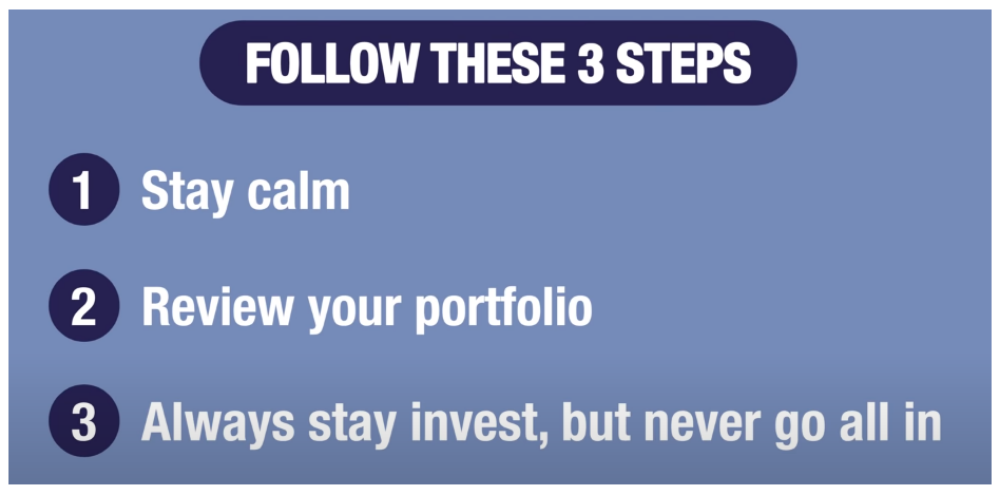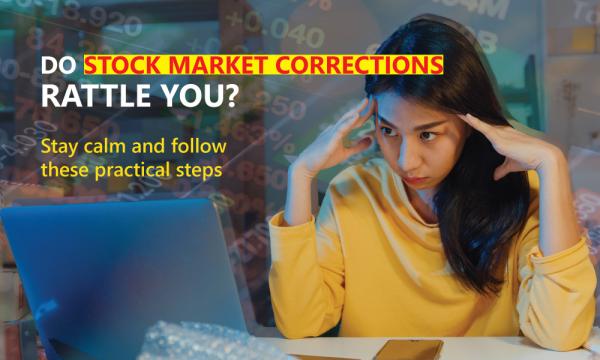May is the financial results season for listed companies. As Covid-19 continues to affect businesses, many stocks have taken a hit too. Do not let the sea of red in your portfolio rattle you. Alex Ng, master trainer and speaker at VI College, shares three practical steps on how you can make the best of market corrections.
“Stay calm, review your portfolio, and always stay invested but never all in – I believe you will do just great in your investment journey!” he says.

Click here to join Alex Ng’s Behind the Stock Masterclass for free, and learn how to reduce the risks with his secret stock investing formula.
STAY CALM
If you let your emotions run high when you’re making an investment decision, or any decision for that matter, chances are you will make the wrong decisions or even deadly mistakes, notes Alex.
Alex cautions against making any decisions when you are overly happy, overly sad, or overly fearful.
Stay calm, take a few deep breaths, and move on to Step 2.
REVIEW YOUR PORTFOLIO
With companies releasing their financial results, it’s a good time to review the performance of the companies you have invested in, and your investment in them.
“Look at your portfolio – review the performance of each company, one by one,” says Alex.
How does one review a company’s performance? The company's quarterly financial announcements and investor presentations are the main sources.
“Certain companies, especially US companies, have earnings transcripts where the management team will brief investors what happened during the quarter, and what to expect next etc,” says Alex.
Analyst reports are also great sources for more in-depth analysis and opinions.
“I also subscribe to platforms such as VI App, Seeking Alpha, and Motley Fool to get more information and different views regarding the business,” he adds.
The tools are there but at the end of the day, do form your own investment opinion and valuation before making any decisions, advises Alex.
Read what Alex says on the five misconceptions about investing in the stock market, and with value investing, it matters not whether the market is good or bad.

Scenario 1: When the company performed well
He advocates buying more shares in the companies in your portfolio that have performed well, if their share prices have corrected to reach your fair value or below.
“Of course, if their share price had corrected just 2%, 3%, don’t bother; you can just hold (the stock). But if they corrected more than 10-15% from your purchase price, then you should buy in more. Why? Because right now, the market is actually offering you the opportunity to buy a good company at a lower price,” he says.
Scenario 2: When the company did perform, but not as well as you expected
Assuming you expected the company’s earnings to grow 30% but it only delivered 20% growth. Should you sell?
“No, don’t sell because this is still a decent company except it did not perform as well as you expected. What you can do is you can just hold it. And if its share price had dropped significantly, you can consider buying in more,” says Alex.
Scenario 3: The company’s business has deteriorated; its revenue and profit had dropped. It’s not performing.
“This is the moment you need to be extra calm. Do not panic, do not be fearful,” stresses Alex.
“Ask yourself: why did the business deteriorate? Is it a temporary or permanent issue? Give the business some chance. Shit happens in life; shit also happens in business. So maybe the company did not perform as well in that financial quarter. Never mind, continue to hold it. Give it two or three quarters to prove that it can do better. As humans, we need second chances to prove ourselves; businesses do too,” he reasons.
“If the company has not been performing for the past one year, sell it! However, if the company has not been performing for one or two quarters, it’s fine. Give it another two to three quarters to prove itself. If it still does not perform, then sell it,” he adds.
Scenario 4: I found a better investment opportunity. Can’t I sell my stocks in the poor-performing company and reinvest in a better performing one?
“Of course you can. What I don’t want you to do is sell just because you panicked, because you fear the share price will continue to drop,” Alex says.
ALWAYS STAY INVESTED, BUT NEVER ALL IN
Market corrections are temporary, stresses Alex.
“This is not the time for you to sell everything and cash out. If you cash out everything, and suddenly the share prices rebound tomorrow, you would have missed out,” he says.
He highlights the fact that we would never be able to time the market accurately. “If you cash out of a stock now, you won’t be able to correctly time when exactly its bottom would be to buy back and ride on the rebound,” he reasons.
“Always stay invested but never all in. Why? Because we must always have extra bullets to grab the opportunities during interesting periods just like it is now,” he concludes.
Do you wish to discover the secret stock investing formula that consistently generates good returns yearly? Get your free pass to Behind the Stock Masterclass with Alex Ng now.


